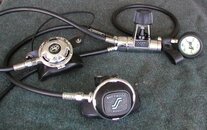What he said
In SE Asia & Australia most shops are using convertible valves now, and on the rare occasion where they haven't in my experience, they'll loan you an adapter (pays to ask in advance of course).
I only own DIN regs and don't have an adapter of my own, never missed a dive yet.
In SE Asia & Australia most shops are using convertible valves now, and on the rare occasion where they haven't in my experience, they'll loan you an adapter (pays to ask in advance of course).
I only own DIN regs and don't have an adapter of my own, never missed a dive yet.




